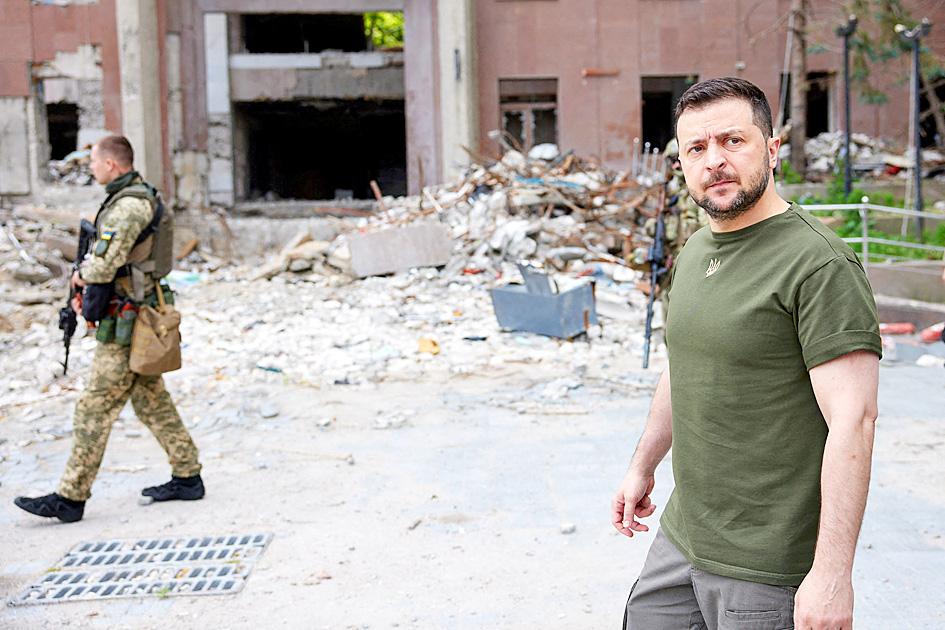Russian forces have stepped up their shelling in Ukraine’s Kharkiv and Donetsk regions, Kyiv said yesterday, after Ukrainian President Volodymyr Zelenskiy said to expect greater hostilities ahead of a historic EU decision on Ukraine’s bid for candidate status.
Nearly four months after Russia launched a bloody invasion of his nation, Zelenskiy said in his evening address on Sunday that there had been “few such fateful decisions for Ukraine” as the one it expects from the EU this week.
“Obviously, we expect Russia to intensify hostile activity this week... We are preparing. We are ready,” he said.

Photo: Reuters / Ukrainian Presidential Press Service
Leaders of the EU’s 27 member states are to discuss at a summit on Thursday and Friday whether to add Ukraine to the list of nations vying for membership.
EU foreign ministers gathering in Luxembourg began the week urging Moscow to stop blocking the export of vitally needed grain from Ukraine, a top global supplier.
“One cannot imagine that millions of tonnes of wheat remain blocked in Ukraine, while in the rest of the world people are suffering hunger. This is a real war crime,” EU High Representative for Foreign Affairs and Security Policy Josep Borrell said.
Moscow has denied responsibility for the food crisis, and blames Western sanctions for the disrupted deliveries that have pushed up cereal prices and fanned fears of famines in vulnerable regions.
On the ground, Russia appeared to be making some battlefield advances in the east.
In its daily update yesterday, Ukraine’s presidency reported heavier Russian shelling in the Kharkiv region in the northeast.
In the Donetsk region, the intensity of the attacks “is growing along the entire front line” it said, leaving at least one person dead and injuring seven people, including a child.
Fighting also continued in the key industrial city of Severodonetsk in the east, with Ukraine saying that it had lost control of the adjacent village of Metyolkine.
“Unfortunately, we do not control Metyolkine anymore and the enemy continues to build up its reserves,” Lugansk Governor Sergiy Gaiday wrote on social media.
Moscow’s forces have for weeks been battling to seize the eastern Donbas region, after being repelled from other parts of the nation following the Feb. 24 invasion.
A chemical plant in Severodonetsk, where hundreds of civilians are said to be sheltering, was being shelled “constantly,” Gaiday said.
On Sunday, NATO Secretary-General Jens Stoltenberg said that the war could grind on “for years,” and urged Western nations to be ready to offer long-term military, political and economic aid.
Ukraine has repeatedly urged Western nations to step up their deliveries of arms, despite warnings from nuclear-armed Russia that it could trigger wider conflict.
The Russian Ministry of Defense on Sunday said that it had launched missile strikes during the previous 24 hours, with one attack on a top-level Ukrainian military meeting near the city of Dnipro killing “more than 50 generals and officers.”
It said that it also targeted a building housing weapons in Mykolaiv, destroying Ukrainian artillery and armored vehicles.
There was no independent verification of the claims.

ENDEAVOR MANTA: The ship is programmed to automatically return to its designated home port and would self-destruct if seized by another party The Endeavor Manta, Taiwan’s first military-specification uncrewed surface vehicle (USV) tailor-made to operate in the Taiwan Strait in a bid to bolster the nation’s asymmetric combat capabilities made its first appearance at Kaohsiung’s Singda Harbor yesterday. Taking inspiration from Ukraine’s navy, which is using USVs to force Russia’s Black Sea fleet to take shelter within its own ports, CSBC Taiwan (台灣國際造船) established a research and development unit on USVs last year, CSBC chairman Huang Cheng-hung (黃正弘) said. With the exception of the satellite guidance system and the outboard motors — which were purchased from foreign companies that were not affiliated with Chinese-funded

PERMIT REVOKED: The influencer at a news conference said the National Immigration Agency was infringing on human rights and persecuting Chinese spouses Chinese influencer “Yaya in Taiwan” (亞亞在台灣) yesterday evening voluntarily left Taiwan, despite saying yesterday morning that she had “no intention” of leaving after her residence permit was revoked over her comments on Taiwan being “unified” with China by military force. The Ministry of the Interior yesterday had said that it could forcibly deport the influencer at midnight, but was considering taking a more flexible approach and beginning procedures this morning. The influencer, whose given name is Liu Zhenya (劉振亞), departed on a 8:45pm flight from Taipei International Airport (Songshan airport) to Fuzhou, China. Liu held a news conference at the airport at 7pm,

Taiwan was ranked the fourth-safest country in the world with a score of 82.9, trailing only Andorra, the United Arab Emirates and Qatar in Numbeo’s Safety Index by Country report. Taiwan’s score improved by 0.1 points compared with last year’s mid-year report, which had Taiwan fourth with a score of 82.8. However, both scores were lower than in last year’s first review, when Taiwan scored 83.3, and are a long way from when Taiwan was named the second-safest country in the world in 2021, scoring 84.8. Taiwan ranked higher than Singapore in ninth with a score of 77.4 and Japan in 10th with

GRIDLOCK: The National Fire Agency’s Special Search and Rescue team is on standby to travel to the countries to help out with the rescue effort A powerful earthquake rocked Myanmar and neighboring Thailand yesterday, killing at least three people in Bangkok and burying dozens when a high-rise building under construction collapsed. Footage shared on social media from Myanmar’s second-largest city showed widespread destruction, raising fears that many were trapped under the rubble or killed. The magnitude 7.7 earthquake, with an epicenter near Mandalay in Myanmar, struck at midday and was followed by a strong magnitude 6.4 aftershock. The extent of death, injury and destruction — especially in Myanmar, which is embroiled in a civil war and where information is tightly controlled at the best of times —